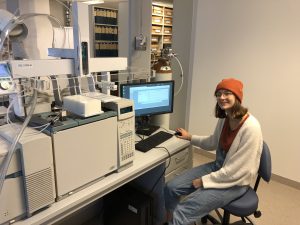Ricarda Runte writes:

I am a German Geosciences student and focused during my bachelor’s on Environmental Geochemistry, Hydrogeology and Quaternary Geology. After completing my Bachelor thesis, I got the amazing opportunity to go abroad for an internship at the University of Bergen. This was made possible by a scholarship from the DAAD (German Academic Exchange Service). The organization offers scholarships for internships in research each year in their RISE worldwide program, in which students from all over the world can take part in experiencing working in research at another place in the world.
I stayed at UiB for 8 weeks in total and am working on different projects in the field of Paleoecology, specifically pollen chemistry. I had the opportunity to work on different projects within this field in collaboration with the team. At first, we got the GC/MS (gas spectroscopy with coupled mass spectrometry) back up and running again, which is great as it is the device mostly used by the group to analyze the chemical composition of pollen. In order to make the sample runs on our device comparable with sample runs from other institutions a calibration of the device is needed. For this, I picked certain amounts of pollen with the help of an inverted microscope to create some calibration curves.
After successfully calibrating the GC/MS, we ran samples of different types of pollen from another research group. Afterwards, I started with preparing samples of Quercus pollen (oaks) under the microscope and running them on the GC/MS. For this different types of Quercus pollen from different locations from Florian Muthreich’s project are used to compare their chemical composition to each other.
At the same time, I am working on a literature research on the different ways of how to isolate sporopollenin (the main part of the pollen exine) from modern pollen. If successfully isolated this could be an opportunity to increase the comparability of modern pollen to fossil pollen, as the other particles of the pollen are degraded over time.
So far, I have really enjoyed my time in the research group and would love to work with them again sometime. Additionally, I love spending time in Bergen and can only suggest coming here to everyone, especially those who love to spend time outdoors going hiking, climbing, kayaking or swimming.
